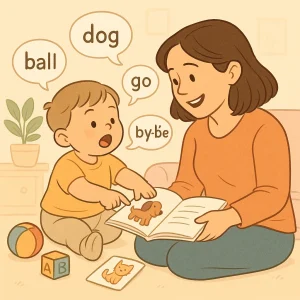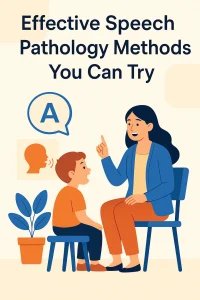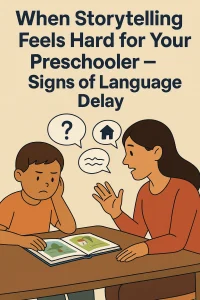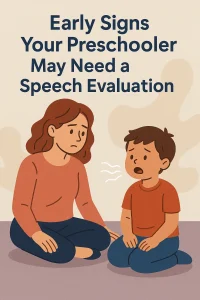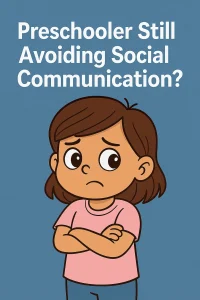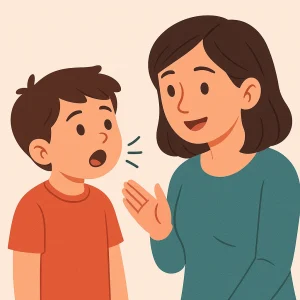How to Know If Your Kid Needs Speech Therapy?
By Rajini D
Last Updated: February 21, 2024
Welcoming your child’s first words is a milestone that fills every parent’s heart with joy and anticipation for the journey ahead. Yet, as we navigate through the various stages of our little ones’ growth, it’s natural for questions and concerns about their speech and language development to surface. Are they on track? Should they be forming more words by now? Such questions are not just common—they’re a sign of the deep care and attention we devote to our children’s well-being.
In the vast world of child development, understanding when and if to seek speech therapy for your child is crucial. It’s not just about correcting speech; it’s about nurturing confidence, easing communication, and fostering a sense of connection with the world around them. Each child’s journey is unique, filled with its own set of milestones and moments of wonder. Yet, certain signs can help us determine whether to consider speech therapy as a supportive path in their developmental adventure.
Understanding Speech Development in Children
As we embark on this journey together, it’s important to lay the foundation with a clear understanding of speech and language development in children. Knowing what to expect at various stages can illuminate the path ahead, helping us recognize when deviations may suggest a need for support, such as speech therapy.
Typical Milestones of Speech and Language Development
Speech and language milestones serve as guides to understanding how most children develop communication skills from infancy through early childhood. Here’s a brief overview:
- Birth to 6 Months: Infants start by cooing and making pleasure sounds. They respond to their name and begin to understand basic requests.
- 7 to 12 Months: Babbling begins, with babies often saying “mama” or “dada” without specific meaning. They start to recognize words for common items like “cup” or “shoe.”
- 1 to 2 Years: Toddlers begin to say words more clearly and may know about 20 words at 18 months. They start to combine two words to form simple sentences like “more milk.”
- 2 to 3 Years: Vocabulary rapidly expands, and sentences become longer and more complex. Children at this age begin to use language for asking questions and expressing needs.
- 3 to 4 Years: Children can be understood by unfamiliar listeners most of the time. They use sentences of five to six words and understand simple rules of grammar.
- 4 to 5 Years: Vocabulary continues to grow, and children use sentences that are more detailed. They can tell stories and engage in conversations.
Read more about on Speech and language milestones – 5 to 6 years
The Variability in Speech Development
While these milestones provide a framework, it’s essential to acknowledge the wide range of normal variability in speech and language development among children. Some may sprint through these milestones, while others take a more leisurely pace. This diversity in development is often within the bounds of normal, but it underscores the importance of monitoring and engaging with your child’s communicative growth.
Observing, interacting with, and listening to your child are key practices that can help you tune into their developmental pace. If you notice your child significantly deviating from these milestones, or if there seems to be a regression in their speech and language skills, it might be time to consult a professional. This doesn’t necessarily signal a problem, but it’s a proactive step to ensure your child receives any support they may need.
Also Read: Speech and Language Milestones: 0 to 12 Months
Recognizing the Signs Your Child May Need Speech Therapy
It becomes crucial to identify the signs that may indicate your child could benefit from speech therapy. Recognizing these signs early can make a significant difference in their development and overall well-being.
Early Indicators to Watch For
Early communication challenges can vary widely among children, but there are common indicators that could suggest your child might need additional support:
- Not Babbling by 6-9 Months: Babbling is a key early milestone in speech development. If your child isn’t making a variety of sounds or babbling sequences by this age, it’s worth discussing with a professional.
- Limited Vocabulary for Age: By the age of 2, children typically have a vocabulary of around 50 words and start combining them into simple phrases. A noticeably smaller vocabulary or lack of word combinations could be a sign to seek advice.
Learn more about on Understanding Speech Delay: Causes, Milestones, and Therapy.
- Difficulty Understanding Simple Instructions: If your child seems to struggle with following simple, age-appropriate directions by the time they are 2, it may indicate difficulties with understanding language.
Read more Speech and Language Milestones: 0 to 12 Months
Speech and Language Red Flags
As children grow, their speech and language skills become more complex. Here are specific concerns that might emerge:
- Issues with Articulation: Difficulty pronouncing sounds or words clearly beyond the expected age can indicate articulation issues. For example, a child who continues to say “wabbit” for “rabbit” beyond the age of 5 may need support.
- Understanding and Using Language: Challenges with forming sentences, using appropriate grammar, or difficulty in understanding questions and instructions can signal language difficulties.
- Social Interaction Difficulties: If your child struggles to use language for social purposes, like greeting others, asking for help, or participating in conversations, this might be a sign of a speech or language disorder.
The Role of Speech Therapy in Child Development
Speech therapy plays a vital role in helping children overcome challenges with communication. This specialized form of therapy focuses on improving a child’s speech and abilities to understand and express language, including nonverbal language. Speech therapists, or speech-language pathologists (SLPs), are trained professionals who work closely with children experiencing a wide range of communication difficulties, from simple articulation delays to more complex language disorders.
Benefits of Speech Therapy
The benefits of speech therapy extend far beyond just helping a child pronounce words correctly. It can significantly enhance a child’s ability to communicate effectively with others, boosting their confidence and social skills. Additionally, speech therapy can improve a child’s ability to understand and process language, which is crucial for academic success and everyday interactions.
Explore more about Unlocking Communication: Effective Speech Therapy for Autism.
Success Stories
Consider the story of Alex, a 4-year-old who had difficulty making certain sounds, making it hard for others to understand him. After six months of regular speech therapy, not only did Alex’s articulation improve, but he also became more confident in participating in class and making new friends.
How to Support Your Child’s Speech Development at Home
As parents and caregivers, you play a crucial role in your child’s speech and language development. Here are practical tips to support your child at home:
Engage in Interactive Play: Play is a child’s way of exploring the world. Use toys, books, and everyday activities as opportunities to introduce new words and concepts, encouraging your child to express themselves.
Read Together: Reading with your child is one of the most effective ways to boost language development. Ask questions about the story, encourage them to predict what will happen next, and introduce them to new vocabulary.
Sing Songs and Nursery Rhymes: Singing is not only fun but also introduces rhythm and rhymes, which can help with speech development. Encourage your child to sing along and perform actions that go with the songs.
Practice Listening Skills: Give your child simple instructions to follow to help them understand and process language better. Make this a fun activity by turning it into a game.
Encourage Imitation: Children learn a lot by copying others. Use daily routines to model speech and language, encouraging your child to imitate your actions and words.
Celebrate Efforts: Acknowledge and celebrate your child’s attempts to communicate, regardless of clarity or correctness. This encouragement will boost their confidence to keep trying.
Learn more on Home based Speech Therapy Activities – Fun with Numbers
Speech Therapy Techniques and Activities
| Technique/Activity | Age Group | Goals |
|---|---|---|
| Picture Books | Toddlers (1-3 years) | Enhance vocabulary, understanding of simple concepts, and narrative skills. |
| Mirror Exercises | Preschool (3-5 years) | Improve articulation and mouth movement awareness through imitation and repetition. |
| Interactive Storytelling | Toddlers to School-age (2-7 years) | Foster imagination, sequence understanding, and complex language use. |
| Singing and Music | Infants to Preschool (6 months-5 years) | Encourage rhythm and phonemic awareness, which are foundational for speech sounds. |
| Flashcards with Actions | Toddlers to Preschool (2-4 years) | Build vocabulary and action-word association through visual and physical interaction. |
| Role-Playing Games | Preschool to School-age (4-8 years) | Support social use of language, problem-solving, and narrative development. |
| ‘Simon Says’ Game | Toddlers to Preschool (2-5 years) | Enhance listening skills, following directions, and body awareness. |
| Sound Repetition Games | Toddlers (1-3 years) | Assist in the development of clear articulation and sound recognition. |
| Blowing Bubbles/Whistles | Toddlers to Preschool (2-4 years) | Strengthen mouth muscles and breath control for speech production. |
| Matching Games with Sounds | Toddlers to Preschool (2-5 years) | Promote phonemic awareness and initial sound identification. |
Read more on Engaging Food Recognition Activities for Young Children: A Guide for Parents.
Consulting with Professionals
If you’ve noticed signs that your child might benefit from speech therapy, the first step is to consult with a professional who can provide a comprehensive evaluation. This evaluation will help determine the specific areas of need and the best course of action to support your child’s development.
- When to Seek a Speech Evaluation: It’s advisable to seek an evaluation if your child shows persistent difficulties with speech and language that seem out of step with their peers. This can include challenges with pronunciation, understanding instructions, using age-appropriate vocabulary, or engaging in conversation.
- Finding Qualified Speech Therapists: WellnessHub offers a valuable resource for parents looking to find qualified speech therapists. Our platform connects you with experienced professionals who specialize in pediatric speech and language development, ensuring that you find the right support for your child’s specific needs.
Explore more How to find the right Autism therapy center for my child?
Recognizing the Need for Speech Therapy: Signs vs. Misconceptions
| Sign/Misconception | Reality | Explanation |
|---|---|---|
| Late Talking | Sign | Delayed speech milestones can indicate underlying issues. Early evaluation is recommended. |
| Stuttering in Toddlers | Often a Sign | While some stuttering can be normal during language development, persistent or severe stuttering should be evaluated. |
| Mispronouncing Letters | Common Misconception | Many children mispronounce sounds; this is often part of normal development and improves with age. However, persistent issues by certain ages may need attention. |
| Quiet Child | Misconception | A quiet demeanor isn’t necessarily a sign of speech delay. However, if paired with other signs of speech or language delays, evaluation could be beneficial. |
| Difficulty Following Directions | Sign | Struggles with understanding or following directions can indicate issues with receptive language skills. |
| Frequent Frustration During Communication | Sign | Regular frustration or withdrawal during attempts to communicate can signal speech or language difficulties. |
| Social Interaction Challenges | Sign | Difficulty engaging in social interactions or play can indicate a need for speech therapy to address communication skills. |
Partnering with Your Child’s Speech Therapist
Once you’ve connected with a speech therapist, the journey toward improvement becomes a collaborative effort between you, your child, and the therapist. Active participation and partnership with your child’s speech therapist are key to achieving the best outcomes.
- Collaboration Is Key: Regular communication with the speech therapist will keep you informed about your child’s progress and any adjustments needed in their therapy plan. It’s also an opportunity to share observations from home, which can be invaluable in tailoring the therapy to your child’s needs.
- Incorporating Strategies at Home: Your child’s speech therapist can provide specific strategies and exercises that can be practiced at home. Integrating these activities into your daily routine can reinforce the skills being developed in therapy sessions, creating a consistent and supportive environment for your child’s growth.
- Celebrate Milestones: Recognizing and celebrating each step forward, no matter how small can boost your child’s confidence and motivation. It’s important to focus on the progress being made, reinforcing the positive impact of therapy on their communication skills.
Taking these next steps towards consulting professionals and partnering with a speech therapist marks a proactive approach to supporting your child’s development. WellnessHub is here to assist you on this journey, offering resources, support, and access to qualified professionals who can make a difference in your child’s life.
Conclusion
Navigating the journey of speech and language development is filled with both challenges and milestones, embodying a journey of hope, discovery, and growth. Through understanding the signs that may indicate a need for speech therapy, embracing the benefits it offers, and engaging in supportive practices at home, we pave a path toward empowering our children with the gift of communication. Speech therapy is not just about overcoming hurdles; it’s about unlocking the full potential of our children’s ability to express themselves, connect with others, and navigate the world around them with confidence.
WellnessHub stands beside you in this journey, offering guidance, resources, and access to qualified professionals dedicated to nurturing your child’s development. Our mission is to ensure that every child finds their voice, reaching their full communicative potential. As we conclude, remember that your commitment and love for your child’s well-being illuminate the path forward. Together, we look towards a future where every child’s voice is heard, understood, and celebrated.
Frequently Asked Questions:
1. How Do I Know If My Child Needs Speech Therapy?
Look for signs like delayed speech milestones, difficulty following instructions, unclear speech, limited vocabulary for their age, and challenges with social interactions. Each child develops at their own pace, but consistent difficulties in these areas might indicate the need for a professional evaluation.
2. At What Age Should Speech Therapy Begin?
Speech therapy can be effective at any age, but early intervention is key. It’s recommended to start as soon as you notice signs of speech or language delays, typically around 18 months to 2 years old. However, it’s never too late to seek help, and benefits can be seen at any age.
3. How Long Does a Child Need to Attend Speech Therapy?
The duration of speech therapy varies depending on the child’s needs, the severity of the speech or language delay, and how the child progresses with therapy. Some children may see significant improvement within a few months, while others may benefit from longer-term support.
4. Can Parents Support Speech Therapy at Home?
Yes, parental involvement is crucial. Speech therapists often provide exercises and activities for parents to do at home with their child. Engaging in reading, singing, and playing while focusing on clear speech and language can reinforce therapy goals.
5. How Can I Find a Qualified Speech Therapist for My Child?
You can start by consulting with your pediatrician, who can give you a referral. Additionally, WellnessHub offers a platform to connect with qualified speech therapists specialized in pediatric speech and language development, ensuring you find the right support for your child.
6. What Are the Benefits of Speech Therapy for Children?
Speech therapy can significantly improve a child’s ability to communicate effectively, enhancing their academic performance, social skills, and overall confidence. It addresses a range of speech and language issues, facilitating clearer speech, better understanding and use of language, and improved social interaction abilities.
7. Is Speech Therapy Covered by Insurance?
Coverage varies by insurance provider and policy. Many insurance plans do cover speech therapy for children, especially when it’s deemed medically necessary. It’s important to check with your insurance provider for specific coverage details related to speech therapy services.
8. What’s the Difference Between a Speech Delay and a Language Disorder?
A speech delay refers to a delay in the ability to use sounds to form words clearly and correctly, often impacting how a child pronounces words. A language disorder, on the other hand, affects a child’s ability to understand and use words in context, impacting their ability to communicate effectively with others. Speech therapy can address both issues, tailoring strategies to each child’s specific needs.
9. Can Speech Therapy Help Children with Autism?
Yes, speech therapy is often a key component of support for children with autism. It can help improve both verbal and non-verbal communication skills, social interaction abilities, and understanding and use of language. Speech therapists work closely with each child to address individual challenges and strengths, often in collaboration with other professionals involved in the child’s care.
10. How Do I Prepare My Child for Their First Speech Therapy Session?
Preparing your child for speech therapy can involve discussing what will happen in a positive and reassuring manner, emphasizing that they’ll be playing games and doing fun activities with a friendly therapist. It’s also helpful to read books or watch videos about speech therapy with your child to familiarize them with the concept. Remember to keep the conversation light and encouraging to build a positive outlook towards their upcoming sessions.
About the Author:
Rajini, M.Sc., Speech-Language Pathologist (9+ years of experience)
Rajini is a passionate and dedicated Speech-Language Pathologist with over 9+ years of experience, specializing in both developmental speech and language disorders in children and rehabilitation in adults. Driven by a desire to empower each individual to find their voice, Rajini brings a wealth of experience and a warm, genuine approach to therapy.
Currently, at Wellness Hub, she thrives in a team environment that values innovation, compassion, and achieving results for their clients.
Connect with Rajini to learn more about how she can help you or your loved one find their voice.
Book your Free Consultation Today
Parent/Caregiver Info:
Client’s Details:
* Error Message


